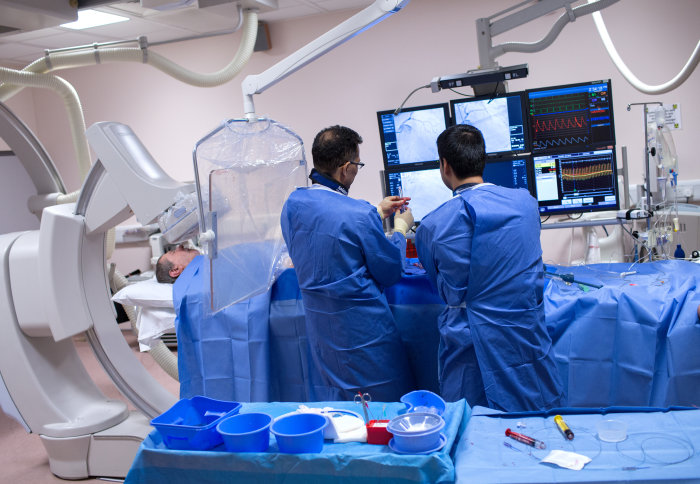New vision for improved heart and lung care and research in north west London

Proposal to improve heart and lung care and research would see majority of Royal Brompton services remain in north west London.
Imperial College London, in collaboration with Imperial College Healthcare NHS Trust and Chelsea and Westminster NHS Foundation Trust, has today finalised an initial joint proposal to improve heart and lung services locally and nationally that will see the majority of the Royal Brompton’s services remaining in north west London.
The proposal - which will now be submitted to NHS England for consideration alongside the Royal Brompton’s own proposal to move all of its services to a site adjacent to St Thomas’ and Evelina Children’s hospitals in south London - aims to build on existing clinical and research links across the sector to accelerate improvements and explore opportunities for better diagnostics, care and treatments.
Our new proposal has three main areas of development:
- A new national cardiovascular and respiratory centre of excellence at Hammersmith Hospital: We will bring together the existing synergies between many specialist services at Hammersmith Hospital and the Royal Brompton to form a new hub of specialist expertise. The Royal Brompton’s specialist services benefit from the internationally renowned expertise of Imperial’s National Heart and Lung Institute which will consolidate activities on the Hammersmith Hospital site, enabling closer links with the nearby Imperial College London development at White City. The hub will be supported by new state-of-the-art facilities for cardiovascular and respiratory care and research.
- An integrated children’s hospital network for north west London and a new academic centre for child health: Building on existing collaborations such as the north west London paediatric surgical network, which has its primary base at Chelsea and Westminster Hospital, we will bring together all of our specialist children’s services with many of those from the Royal Brompton to create a comprehensive children’s service for the sector across our sites but under a single management team. This will enable us to have a combined workforce and training programmes as well as shared ways of working which will help reduce unwarranted variations in care, including across key pathways such as for asthma, complex allergies, Kawasaki disease and obstructive sleep apnoea. There will also be a new Imperial Centre for Child Health to support collaboration between researchers and clinical academics working in neonatal, paediatric and adolescent health.
- A new centre for cystic fibrosis at Chelsea and Westminster Hospital: This will enable us to make the most of links to Imperial’s internationally leading research programmes for cystic fibrosis, maintain care closer to home for patients in north west London and ensure a balanced geographical coverage of cystic fibrosis services across London. It will also incorporate cystic fibrosis care for children within the new integrated children’s hospital network and, for adults, with other key specialist services locally, including infectious disease, gastroenterology, endocrine and women’s services.
Imperial College Healthcare NHS Trust Chief Executive, Professor Tim Orchard, said: “For some very specialist services at the Royal Brompton, such as for congenital heart disease where NHS England has decided that standards cannot be met on a standalone site, we see a clear rationale for re-location alongside the excellent provision already offered by St Thomas’ and Evelina Children’s hospitals.However, for many other specialties, we believe building on well-established networks and services in north west London will be better for patients, cost the NHS less and cause less disruption.”
Chelsea and Westminster NHS Foundation Trust Chief Executive, Lesley Watts, said: “As we develop more life-long and seamless care, it would be a backwards step to dislocate a huge amount of specialist heart and lung care from other services provided locally. We think the opportunity created by change at the Royal Brompton should instead be used to forge closer links between existing partners, either through the proposals we have put forward today or, potentially, through an alternative option that enables the Royal Brompton to remain at its current site. We want to work now with NHS England and with the Royal Brompton to involve patients and other stakeholders in developing our initial plans and to determine the option that will have the most beneficial impact, now and for the future.”
Dean of the Faculty of Medicine at Imperial College London, Professor Jonathan Weber, said: “Imperial leads nationally on research for both cardiovascular and respiratory disease. A deep and long-lasting partnership with our local NHS partners, including the Royal Brompton, has led to significant improvements in patient care both nationally and internationally. Over the last 20 years, our shared achievements include new treatments for chronic obstructive pulmonary disease, hay fever, coronary disease, chronic respiratory failure, hypertension, aortic disease and pulmonary hypertension. Our proposal will preserve and strengthen these benefits for our patients and staff and for the wider NHS."
Article text (excluding photos or graphics) © Imperial College London.
Photos and graphics subject to third party copyright used with permission or © Imperial College London.
Reporter
Mr Al McCartney
Faculty of Medicine Centre